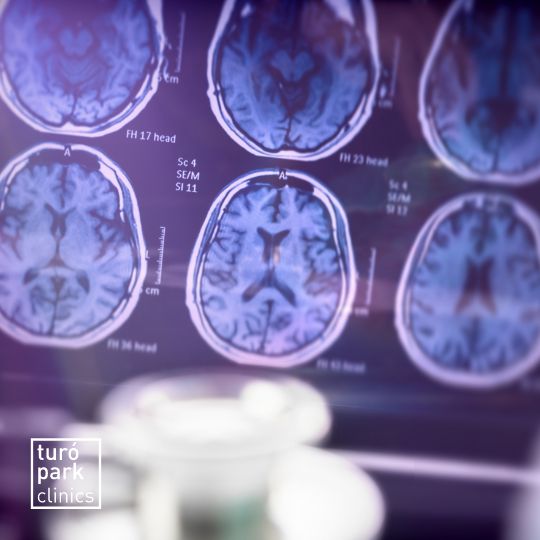Do you suffer from a neurodegenerative disease?
Neurodegenerative diseases can have a very significant impact on the lives of those who suffer from them, as well as their friends and family. They are characterised by cognitive impairment and they vary widely in the age of manifestation, hence why early detection and diagnosis is crucial.
At Turó Park Clinics we have neurology specialists for the effective management of these diseases. It is very important that people suffering from any type of neurodegenerative condition seek support and appropiate treatments to make the disease less of a challenge.
What are these diseases?
Neurodegenerative diseases are a group of diseases characterised by the progressive degeneration and death of neurones in the nervous system. The deterioration of this cells usually result in difficulty or impairment in certain bodily functions such as movement, balance, memory and other cognitive abilities.
They are chronic diseases that unfortunately have no cure yet and in many cases, lead to disability and a worsened quality of life for the patient.

What are the causes?
The causes of most of these diseases are unknown, but depending on the disease, contributing factors can be attributed to their development. The most studied factors are:
- Genetic: several neurodegenerative diseases have in common a genetic predisposition that makes patients more susceptible to developing certain diseases. Diseases such as early onset Alzheimer's, Huntington's disease or SMA have a genetic basis caused by mutations in certain genes.
- Biological factors: such as protein accumulations in the brain that characterise dementia with Lewy bodies or chronic brain inflammation, which is known to aggravate and accelerate the progression of neurodegenerative diseases.
- Ageing: probably the most important risk factor for neurodegenerative diseases. Ageing involves the deterioration of certain biological mechanisms in our body, which promote cognitive decline.
- Viral and bacterial infections: there are several infections that have been associated with the development of neurodegenerative diseases. These include the Herpes Simplex virus, HIV or Helicobacter Pylori.
What are the most common neurodegenerative diseases?
It is the most common cause of dementia among older adults and is characterised by the progressive loss of memory, cognitive skills and behavioural changes. The disease progresses slowly and often worsens over time, thus limiting the ability to lead a normal life for patients. The exact cause is not known, but genetic, environmental and lifestyle factors are thought to influence its development.
It is a chronic disease that primarily affects movement control and is characterised by the loss of dopamine-producing neurons in the brain. Dopamine is essential for regulating movement and the loss of dopamine-producing neurons causes symptoms. These include tremors, muscle stiffness, bradykinesia (slowness of movement) and balance problems. Like Alzheimer's, the exact cause is unknown, but genetic and environmental factors are thought to play a significant role.
Also known as Lou Gehrig's disease, it affects motor neurons and the spinal cord, leading to loss of muscle control, making it difficult to speak, swallow and breathe. Unfortunately, life expectancy in ALS patients is an average of 2 to 5 years due to being unable to breathe on their own by the end, although there are cases where the patient lives for 10 years or more. Most cases of ALS are sporadic, but about 10% are hereditary.
It is an inherited disorder that causes degeneration of nervous neurons in certain areas of the brain and can lead to cognitive problems and psychiatric disorders. The disease affects motor, cognitive and psychiatric abilities. It is caused by a mutation in the HTT gene that is inherited from an affected parent.
It consists of a group of inherited disorders that affect the motor neurons in the spinal cord that control involuntary muscle movement, leading to muscle weakness and atrophy. There are several types and in the most severe cases it affects the ability to breathe and swallow. The cause is genetic as a result of mutations in the SMN1 gene.
It is a disease similar to Alzheimer's and with resembling symptoms. It is characterised by the presence of abnormal accumulations of proteins in neurons (Lewy bodies) and is usually prevalent in older people. The exact cause is unknown, but is related to abnormal protein deposits in the brain and complex and unpredictable genetic factors.
How are neurodegenerative diseases diagnosed?
Diagnosis of this type of disease is a complex process involving several steps and tests to identify the presence and extent of the disease.
Our doctors will take a detailed medical history followed by a thorough physical and neurological examination. Neuroimaging and laboratory tests will also be performed, as well as a set of cognitive and psychiatric tests. Finally, the follow-up and monitoring of the symptoms and the patient is crucial to adjust the diagnosis and necessary treatment.
Who should undergo testing?
It is recommended to visit an expert if you present:
- Neurological symptoms such as memory loss, disorientation and personality or behavioural changes.
- Problems with coordination and balance.
- Family history of diseases such as Alzheimer's, Huntington's, Parkinson's or ALS.
- Elderly people.
Your health is our priority!
Our neurology department welcomes you for the diagnosis and treatment of neurodegenerative diseases.

